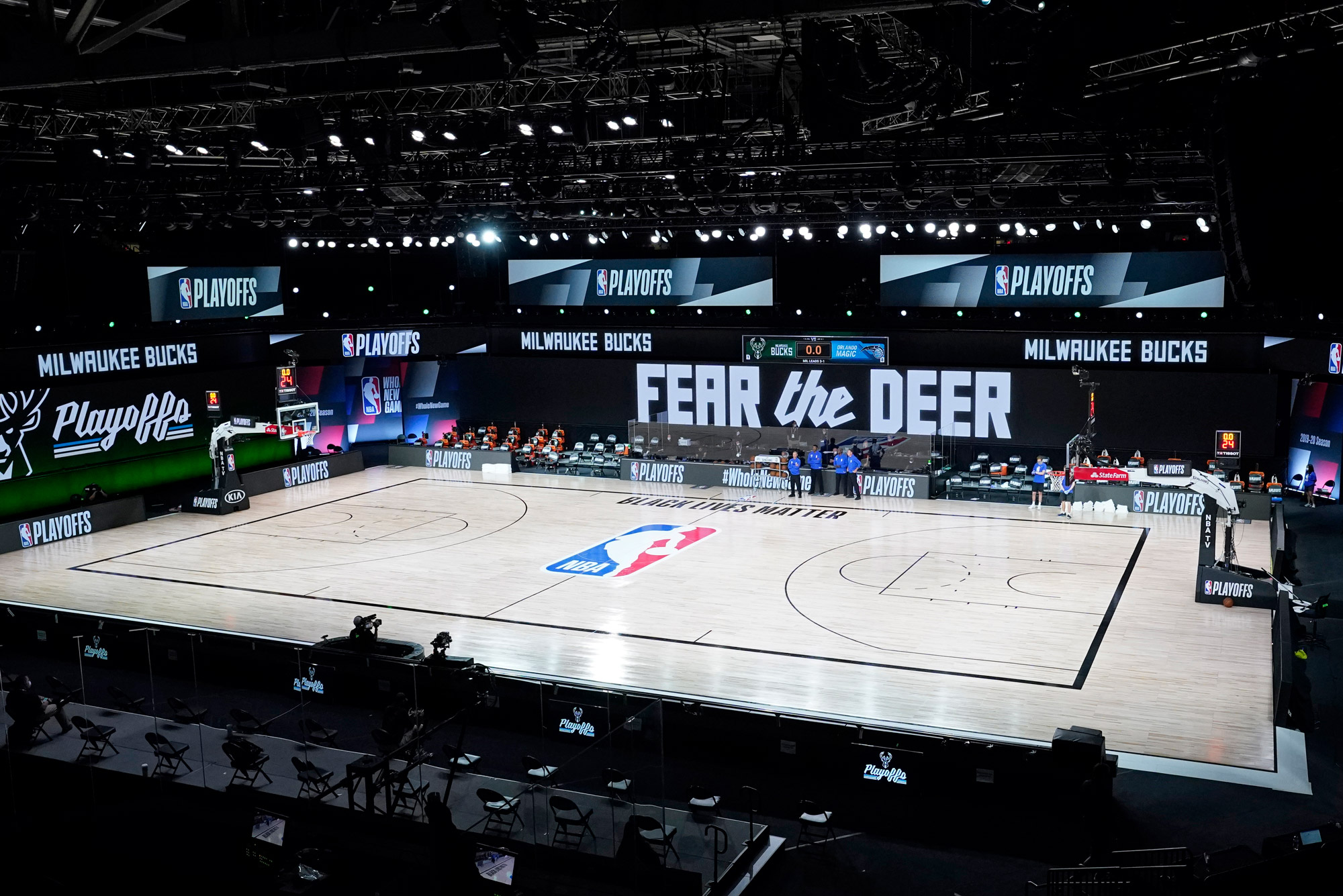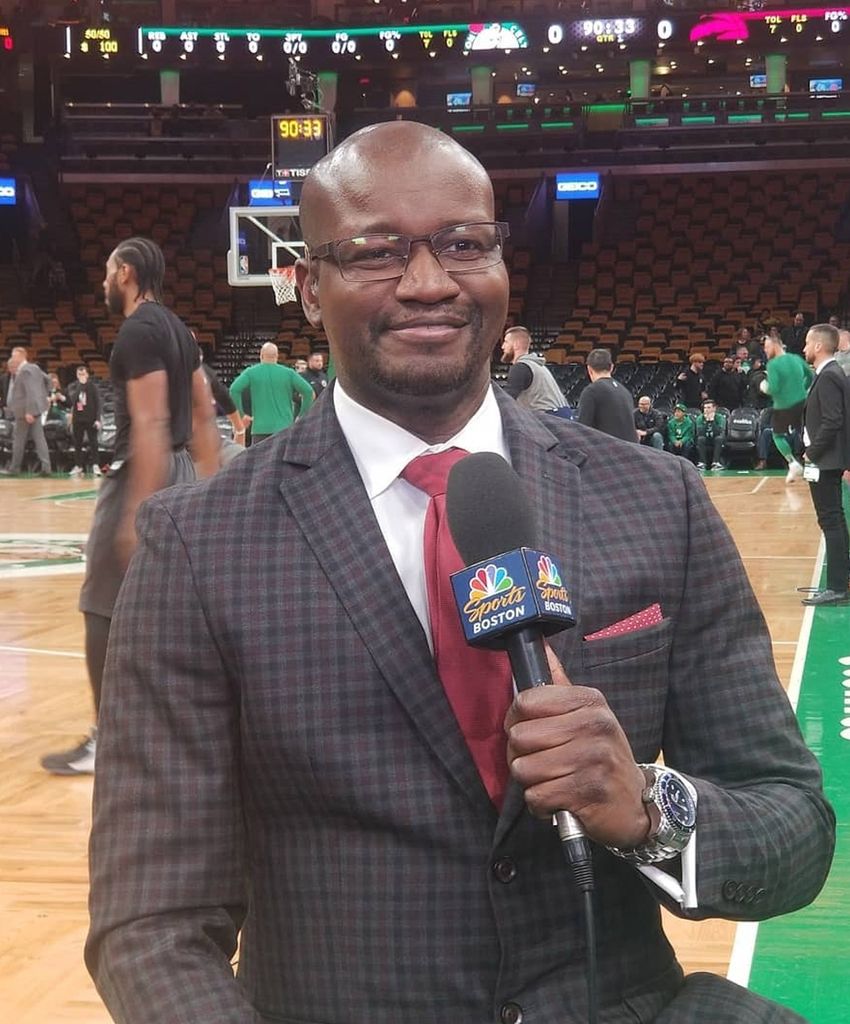Boston Celtics Reporter A. Sherrod Blakely Speaks about the NBA Strike and How It Could Lead to Real change

When the Milwaukee Bucks elected not to take the floor for an NBA playoff game, in protest of racial injustice and the shooting of Jacob Blake on August 23, the rest of the league—and teams across other professional sports—followed suit. Photo by Ashley Landis/AP
NBA Players Strike for Social Justice. What Comes Next?
A. Sherrod Blakely, COM lecturer and NBA reporter, on last week’s strike and how it could translate to real change
On Wednesday, August 26, the Milwaukee Bucks went on strike. While their opponent in the National Basketball Association playoffs, the Orlando Magic, warmed up on the court, the Bucks stayed in their locker room. Three days earlier, 35 miles south of Milwaukee, a Kenosha, Wisc., police officer shot a Black man named Jacob Blake in the back seven times. Daily protests followed, and on Tuesday night, two protesters were shot and killed. “Our focus today cannot be on basketball,” the Bucks’ official statement read.
That statement also demanded that law enforcement and lawmakers be held to the same high standards as professional basketball players and that the Wisconsin State Legislature reconvene to address police accountability. And the Bucks urged everyone to vote in November.

Even though they’re currently sequestered, along with the other NBA playoff teams, in a theoretical “bubble” at Walt Disney World in Orlando, the Bucks’ actions quickly spread across professional sports. The other NBA teams sat out. WNBA teams took Thursday off for a day of reflection and action. Major League Baseball and Major League Soccer teams followed suit, and under pressure from players, the National Hockey League postponed Thursday’s games.
A. Sherrod Blakely, a College of Communication lecturer in journalism, covers the Boston Celtics and the NBA for NBC Sports Boston and has been in touch with players and personnel inside the bubble. He spoke to BU Today about a remarkable week in professional sports—and what he expects will happen next. Just before our interview, the NBA and NBA Players Association announced that the playoffs would resume on Saturday, August 29. That agreement included provisions for the creation of a league-wide social justice coalition and the use of NBA arenas as polling locations for November’s election.
Q&A
With A. Sherrod Blakely
BU Today: What were your thoughts when the Bucks decided not to take the floor the other night?
A. Sherrod Blakely: I was surprised that an NBA team would take these particular measures, but I wasn’t sure what would happen next. I think their goal was to shine a bright light on some of the issues that they had been talking about extensively prior to going into the bubble [and] they have done exactly what I think they intended, which is to keep the focus on those issues and not the game of basketball.
Were you surprised to see other NBA teams and then teams in other sports follow the Bucks’ lead?
The individuals that I’ve been in contact with in the bubble, the one thing that they just did not see coming was how other leagues would respond. All those different pro leagues are now part of the conversation in a much more meaningful way. That was a pleasant surprise to many of the players in the bubble. They took a route that I think was very unexpected, and it jolted a lot of people.
There’s a long history of athlete activism, from John Carlos and Tommie Smith raising gloved fists at the 1968 Olympics to Colin Kaepernick kneeling for the national anthem in 2016. Given that America is still grappling with the same issues of racism, what power do professional athletes actually have?
What we’re seeing is athletes taking greater ownership of being part of this process and this pursuit of change in the way that we are policed, the way that we are governed. They are using their platforms, which are ginormous, to elevate those conversations and challenge society in a way that I don’t think a lot of athletes over the last 15 to 20 years have done. That means Twitter and Instagram, and whenever there’s a microphone in front of them, making sure that they are directing the focus toward systemic change. There is a false narrative that these NBA players are the ones who are going to bring about the change: “How can they possibly do that, so why should I get behind them?” My response is that’s exactly why you get behind them. They’re going to need allies.
What we’re seeing is athletes taking greater ownership of being part of this process and this pursuit of change in the way that we are policed, the way that we are governed. They are using their platforms, which are ginormous, to elevate those conversations and challenge society in a way that I don’t think a lot of athletes over the last 15 to 20 years have done.
The NFL says it’s embracing this movement, the NBA has “Black Lives Matter” written on its courts. It’s also on scoreboards at baseball stadiums. Should we be skeptical of this becoming a marketing slogan?
It’s great when you’ve got “Black Lives Matter” on the court. It looks good, it feels good. But what is it really getting done, right? A lot of the players realize it’s great that all these messages are out there—but what’s going to transform the existence that we have now, and make it more equitable and more inclusive for people of color? The one thing that they have mentioned to me on more than one occasion is the importance of owners within the NBA flexing their muscles for voting rights and for making the kind of systemic change that goes beyond just writing a check. The players are coming to realize that as great as it is to have money from pro leagues going to different organizations, you really need to have more diversity when it comes to elected officials.
What do you see as the role of the sportswriter in this moment?
The role of a sportswriter is to remember who you are at your core, and at your very core, you’re a journalist. Now, for Black journalists, it gets tricky. For most Black journalists, particularly those of us in sports, we’ve often had to find that balance between connecting with these athletes, but not letting that relationship appear as though it is anything beyond professional. That’s really difficult to do at times like this because the very issues that they’re fighting for are issues that I also want to see consistently elevated in the discourse surrounding sports. At the end of the day, no matter how much money those players have, no matter how many bylines I get, no matter how many awards, we are Black men and women and that is the problem: we’re seen as just that. That’s a big part of what a lot of these players are talking about and why a guy like Doc Rivers is breaking down crying about this country not loving us as much as we love it. I don’t know why that is difficult for some people to understand, but it speaks to another layer of issues that this country is dealing with.
Sports has a way of bringing people together—but recently we’ve also seen how polarizing it can be. What is it about sports that can yank us in both directions so strongly?
For as long as I’ve been a sports fan, it always felt like a sanctuary. Whether you’re a Democrat, Republican, Independent, gay, straight, transgender—whatever label is attached to you, it doesn’t matter. But the game has become very politicized. It’s harder for people to sit back and enjoy the game for what it is, for its purity, and I’m not sure that is going to end anytime soon. I love it when all we’re talking about when it comes to athletes is how they perform. But if that’s the only thing that you focus on when you’re talking about athletes, then you’re missing the point of all this. These athletes are trying to break that cycle where, back in the 19th century, Blacks’ job was to perform for white folks and that was all the value that they had. These athletes are trying to tell you, “No, that’s not who we are. That’s not what we’re about. We’re much more layered than that.” What they’re doing is a tremendous step toward bringing about that systemic change.
It’s become a cliché for critics to tell athletes and sportswriters to “stick to sports.” What is your response to that attitude?
It’s very cliché. But I think what’s happened is that the stories that we’re covering force people to take a closer look at themselves, and they don’t like what they see. It makes them uncomfortable. And that is when you know you’re probably headed down the right path, when people get uncomfortable. As society evolves into one that is inclusive, that is diverse, you’re going to have to learn how to be comfortable with being uncomfortable. That is something that Black America has been living with for centuries. I didn’t like the fact that when I went to Syracuse University, and in my COM 101 class, I was the only Black male in a room of 170 students. I don’t like when I’m on a call with my digital team and I’m the only Black voice. But I know if I’m going to be part of this society, I have to learn how to be comfortable with being uncomfortable. And there’s a large segment of our society that hasn’t embraced that notion. They don’t like the idea of being challenged on racism, they don’t like to have some of their subconscious biases and prejudices and racism put in the forefront. They would rather hone in on an element of a story that they feel comfortable attacking than be uncomfortable with embracing the reality of their past and present and the mindset that they need to change their future.
What do you think comes next?
I think we’ll see more messaging by the NBA that focuses on voting. I think you’ll see more players looking at that as an area that they can address in a meaningful way. Players understand that in their own communities they need to find allies who are going to be in positions to implement some of the systemic change that they want to bring about. That’s where ownership comes in. I think you’re going to see more athletes push their owners to support some of those candidates.
This interview has been edited and condensed for clarity.

Comments & Discussion
Boston University moderates comments to facilitate an informed, substantive, civil conversation. Abusive, profane, self-promotional, misleading, incoherent or off-topic comments will be rejected. Moderators are staffed during regular business hours (EST) and can only accept comments written in English. Statistics or facts must include a citation or a link to the citation.